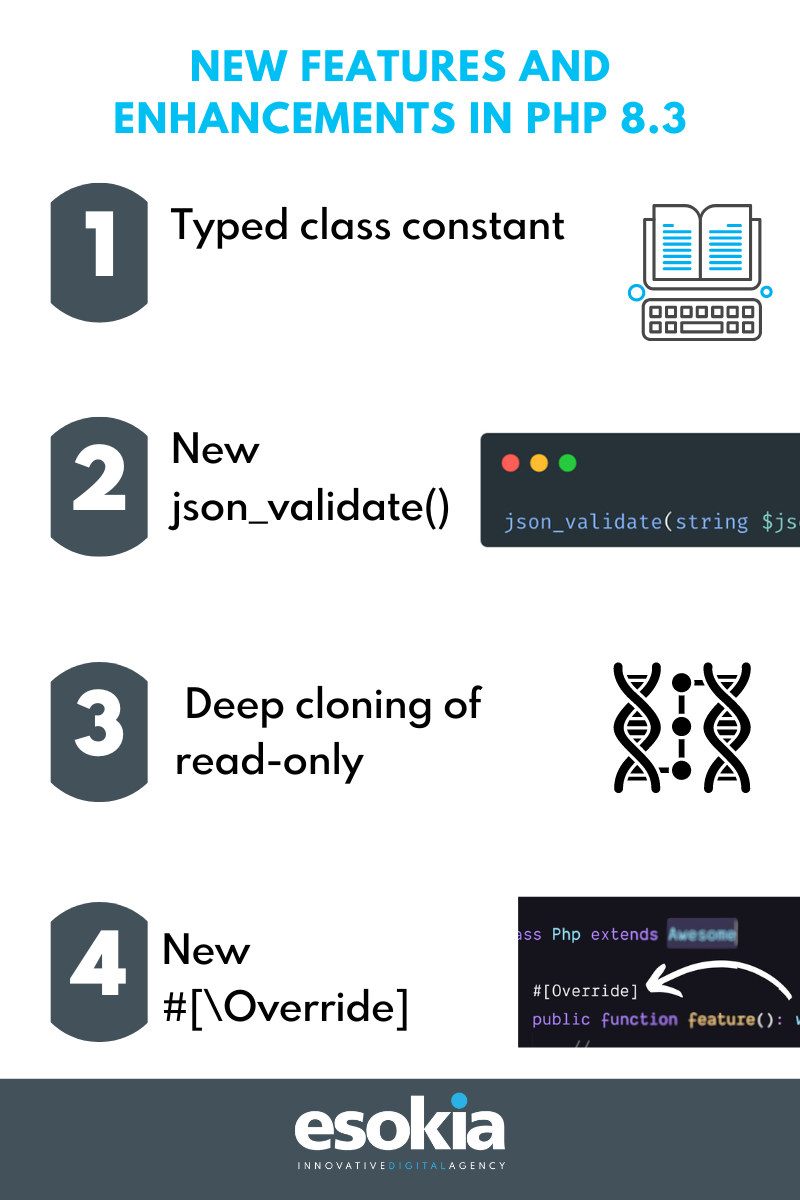PHP 8.3, an essential computer language for web development, introduces significant new features and improvements to optimize your website programming.
What is PHP development ?
PHP development is the process of creating dynamic web applications using the Hypertext Preprocessor programming language, a server-side scripting language widely used for web development.
New features and enhancements in PHP 8.3

What is the typed class constant in PHP 8.3?
The typed class constant, introduced in PHP 8.3, is a major innovation in the web development language. It allows you to specify the type of data that a class constant must contain, thus reinforcing the security of your script and source code.
This feature offers numerous advantages for web development. It improves code security by avoiding type errors, optimizes source code readability and boosts web server performance by avoiding unnecessary type conversions. The typed class constant is therefore an essential tool for programming your website.
How does the new json_validate() function work ?
The json_validate() function is another new feature in PHP 8.3. Essential for your database management, it allows users to validate a JSON string before parsing it. This functionality is a significant advance for the database management system, avoiding errors when parsing source code.
With json_validate(), it is now possible to validate a JSON string before parsing, thus optimizing web server performance. This function is therefore essential for programming your website, whether it's a CMS or an e-commerce site.
What is deep cloning of read-only properties ?
In programming terms, deep cloning of read-only properties is an advanced technique used in the PHP computer language. The web server interacts with the PHP source code to create an exact copy of an object, including its read-only properties. Read-only properties are attributes of an object that cannot be modified once they have been initialized. This feature is essential in web development, particularly when it comes to managing complex objects on a website.
In-depth cloning of read-only properties is achieved by creating a new instance of the object class and copying all the properties of the original object into the new object. This includes read-only properties, which are initialized with the values of the original object. This technique is often used in the development of CMS and e-commerce sites, where the manipulation of complex objects is commonplace.
What is the new #[\Override] attribute?
The #[\Override] attribute is a new feature introduced in the PHP 8 computer language, used in web development. It's an annotation that explicitly signals that a method is intended to replace a parent method. This feature is a great help to developers working on complex scripts or large-scale website projects.
Using the #[\Override] attribute has several advantages. It makes source code more readable and explicit, which is particularly useful when working on a web server. It also ensures code integrity. If the parent method is deleted or renamed, the PHP interpreter will generate an error if the #[\Override] attribute is present. This helps to detect problems earlier and avoid runtime errors.
How does dynamic retrieval of class constants work ?
Dynamic retrieval of class constants is a PHP feature that allows you to access class constants dynamically, i.e. at runtime. This feature offers great flexibility and makes code more concise and readable.
To retrieve a class constant dynamically, you use the syntax ClassName::CONST_NAME. You can replace CONST_NAME with a variable containing the name of the constant you wish to retrieve.
For example, if you have a class constant called MY_CONST and you have a variable $constName that contains the string 'MY_CONST', you can retrieve the class constant using the syntax ClassName::$constName.
In conclusion, dynamic retrieval of class constants is a powerful PHP feature that allows manipulating class constants dynamically. It offers great flexibility and facilitates the manipulation of classes with numerous constants. It's a feature that should be widely used by PHP developers.
What is PHP JIT ?
PHP JIT, an acronym for Just-In-Time compilation, is an advanced programming technique integrated into the PHP computer language. This technique, introduced in PHP 8.0, converts PHP bytecode into native machine code at runtime on the web server. PHP JIT is a powerful tool for web development, especially for optimizing website performance.
PHP JIT works by dynamically compiling the PHP script into native machine code when the source code is executed. This dynamic compilation eliminates the static compilation step typical of compiled programming languages. In addition, PHP JIT, in conjunction with the OPcache extension, is able to optimize the generated machine code according to the execution context. This contextual optimization improves website performance, particularly when interacting with the database and database management system.
However, the effectiveness of PHP JIT in web development is not guaranteed in all cases. In fact, its impact on performance is highly dependent on the type of PHP script being executed. For example, in the context of CMS or e-commerce site development, the use of PHP JIT may not bring any significant improvement. It is therefore essential to test the impact of PHP JIT on your website before deciding to activate it.
Your PHP project is in Esokia's hands: Digital Web Development Experts
If you have a PHP development project, you can trust Esokia. As a digital web agency, we have a team of PHP development experts ready to bring your ideas to life.
Our solid expertise in technologies such as Drupal, WordPress, Symfony, Laravel, Prestashop and Magento, among others, enables us to provide you with high-quality, tailor-made web solutions.
Let us take care of your PHP project and help you achieve your online goals with professionalism and excellence.
- Log in to post comments
